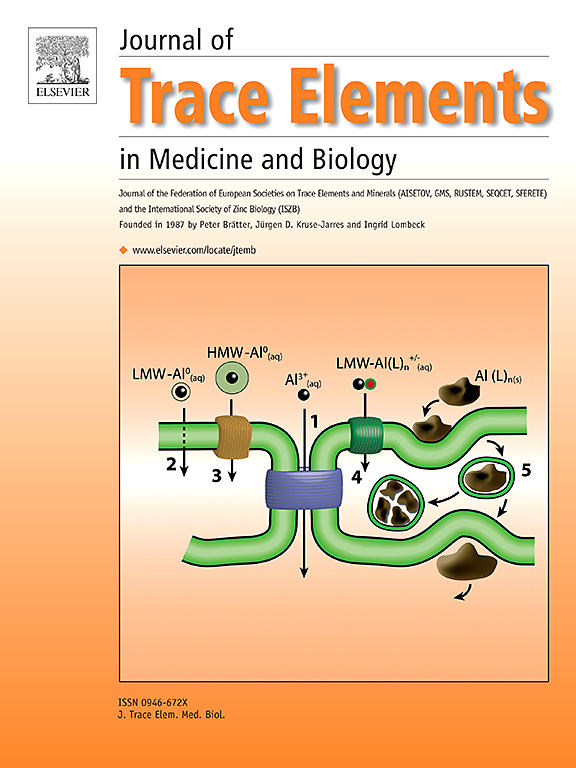Paternal iron deficiency and rapamycin supplementation influence antioxidants status, autophagy and lifespan in Drosophila melanogaster
IF 3.6
3区 医学
Q2 BIOCHEMISTRY & MOLECULAR BIOLOGY
Journal of Trace Elements in Medicine and Biology
Pub Date : 2025-09-06
DOI:10.1016/j.jtemb.2025.127740
引用次数: 0
Abstract
Background
Paternal iron deficiency (ID) is increasingly recognized for its intergenerational health effects. Rapamycin, on the other hand, is known for modulating metabolism, enhancing autophagy, and promoting longevity. This study explores the impact of paternal ID and rapamycin intervention on iron metabolism, antioxidant status, autophagy, telomere regulation, and lifespan in Drosophila melanogaster.
Methods
Male flies (F0) were fed an iron-deficient diet for 14 days, followed by a 30-day intervention with either a normal or rapamycin-supplemented diet. F0 ID males were crossed with normal females to generate F1 offspring. Physiological, biochemical, and gene expression changes were analyzed in F0 flies post-intervention, while F1 offspring were assessed post-eclosion, with a 60-day survival study conducted for both generations.
Results
In F0 ID males, iron chelation significantly (p < 0.0001) reduced body weight, iron levels, and antioxidant enzyme (SOD, CAT) activity, while increasing GSH levels. Gene expression analysis showed significant (p < 0.05) alterations in iron storage (Fer1HCH), autophagy (ATG1), and telomere maintenance (dHeT-A, dTahre, dTart) genes. Rapamycin reduced antioxidant enzyme levels and lifespan in F0 males despite improving oxidative stress markers. In F1 offspring, males on a normal diet exhibited lower iron levels but increased survival, whereas rapamycin enhanced antioxidant status in F1 females without significantly affecting lifespan.
Conclusion
Paternal ID exerts lasting, sex-specific effects across generations. While a normal diet mitigates some adverse outcomes, rapamycin worsens survival in F0 males and has mixed effects on F1 offspring, particularly concerning antioxidant status and longevity.
父系铁缺乏和雷帕霉素补充影响黑腹果蝇的抗氧化剂状态、自噬和寿命
父亲缺铁(ID)越来越多地认识到其代际健康影响。另一方面,雷帕霉素以调节新陈代谢、增强自噬和延长寿命而闻名。本研究探讨了父本ID和雷帕霉素干预对黑腹果蝇铁代谢、抗氧化状态、自噬、端粒调节和寿命的影响。方法用缺铁饲料饲喂小蝇14 d,随后用正常或雷帕霉素补充饲料干预30 d。将F0 ID雄性与正常雌性杂交产生F1后代。研究人员分析了干预后F0果蝇的生理、生化和基因表达变化,并对F1后代在羽化后进行了评估,对两代果蝇进行了60天的生存研究。结果铁螯合显著(p <; 0.0001)降低了F0 ID男性的体重、铁水平和抗氧化酶(SOD、CAT)活性,提高了GSH水平。基因表达分析显示,铁储存(Fer1HCH)、自噬(ATG1)和端粒维持(dHeT-A、dTahre、dTart)基因发生了显著变化(p <; 0.05)。雷帕霉素降低了F0雄性小鼠的抗氧化酶水平和寿命,尽管它改善了氧化应激标志物。在F1后代中,正常饮食的雄性表现出较低的铁水平,但增加了存活率,而雷帕霉素增强了F1雌性的抗氧化状态,但对寿命没有显著影响。结论父系本我对后代具有持久的、性别特异性的影响。虽然正常饮食可以减轻一些不良后果,但雷帕霉素会降低F0雄性的存活率,并对F1后代产生混合影响,特别是在抗氧化状态和寿命方面。
本文章由计算机程序翻译,如有差异,请以英文原文为准。
求助全文
约1分钟内获得全文
求助全文
来源期刊
CiteScore
6.60
自引率
2.90%
发文量
202
审稿时长
85 days
期刊介绍:
The journal provides the reader with a thorough description of theoretical and applied aspects of trace elements in medicine and biology and is devoted to the advancement of scientific knowledge about trace elements and trace element species. Trace elements play essential roles in the maintenance of physiological processes. During the last decades there has been a great deal of scientific investigation about the function and binding of trace elements. The Journal of Trace Elements in Medicine and Biology focuses on the description and dissemination of scientific results concerning the role of trace elements with respect to their mode of action in health and disease and nutritional importance. Progress in the knowledge of the biological role of trace elements depends, however, on advances in trace elements chemistry. Thus the Journal of Trace Elements in Medicine and Biology will include only those papers that base their results on proven analytical methods.
Also, we only publish those articles in which the quality assurance regarding the execution of experiments and achievement of results is guaranteed.

 求助内容:
求助内容: 应助结果提醒方式:
应助结果提醒方式:


